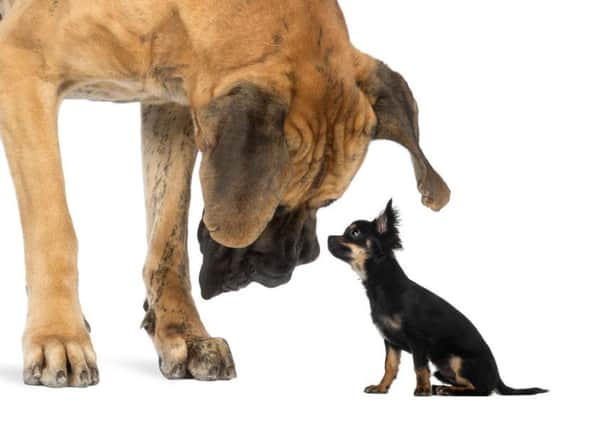Dogs '˜shrinking' as larger breeds fall out of favour


In Britain pedigree bulldogs, boxers and pugs have become increasingly popular in recent years.
The Kennel Club registrations of pugs have climbed from 1,675 in 2004 to 8,071 in 2013, and French bulldogs from 350 to 6,990.
Advertisement
Hide AdAdvertisement
Hide AdOver the last 30 years, pet owners have favoured smaller pedigree dogs with shorter and wider heads.
The popularity of mutts with short, wide heads could be used to predict the prevalence of diseases typically associated with this head shape to help the vets prepare for future cases.
An Australian study investigated 180 breeds from the Australian National Kennel Council (ANKC) from 1986 to 2013, looking at trends in the demand for purebred dogs of various height, size and head shape.
Each breed was assigned to one of four size groups; small (less than 10kg); medium (10kg-25kg); large (25-40kg); and giant (40kg and over).
Advertisement
Hide AdAdvertisement
Hide AdIn total, there was data on 54 small breeds; 62 medium breeds; 42 large breeds and 22 giant breeds registered over that time.
Over the study period, registration of small and medium breeds increased by 4.2 per cent and 5.3 per cent relative to large breeds, and by 11 per cent and 12.1 per cent compared to giant breeds.
Lead researcher, Kendy Teng, from the University of Sydney, Australia, said: “Australians are favouring brachycephalic breeds, dogs with shorter and wider heads, such as the pug and the French bulldog, more than those with longer and thinner heads.
“Looking at data spanning 28 years, we found that the demand for smaller dogs has increased every year from 1986.
Advertisement
Hide AdAdvertisement
Hide Ad“Veterinarians are concerned about brachycephalic dogs’ welfare, as these breeds commonly suffer from breathing difficulties, skin and eye conditions, and digestive disorders.
“In New Zealand, brachycephalic breeds are number four of the top five dog breeds considered by veterinarians to be unsuitable for continued breeding due to compromised health and welfare.
“We expect to see vets in Australia treating more dogs with the conditions described.”
The researchers suggested the change in preferences could reflect shifts in human lifestyle.
Advertisement
Hide AdAdvertisement
Hide AdDogs are now chosen mainly for companionship, rather than being selected to fulfil roles such as hunting or guarding, for which owners would normally choose larger pooches.
The change could also be due to houses getting smaller.
This downsizing could mean that potential owners do not have the space to house a large dog.
In addition, there is a recognised tendency for dogs with young facial features to elicit more care-giving behaviours from humans, part of the so-called baby schema effect.
The study was published in the journal Canine Genetics and Epidemiology.